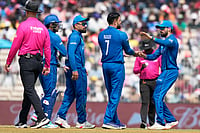With the heavy rain bringing the city to its knees on a second consecutive day, Delhi Cabinet ministers Atishi and Saurabh Bharadwaj visited waterlogged areas in the national capital to take stock of the situation, promising to make full measures to pump the water out.
The national capital recorded 153 mm of rainfall on Saturday and 105.8 mm of precipitation on Sunday. PWD Minister Atishi on Sunday visited Tilak Bridge Underpass and Zakhira Underpass, both submerged, along with officials from her department.
During her visit, the minister inspected the pumping stations located at Tilak Bridge and Zakhira Underpass and also went to the Monsoon Control Room at the PWD headquarters to assess the waterlogging situation in the city.
According to the minister, Delhi received 126mm of rain in just 12 hours on Saturday and more than 150 mm of it in 24 hours. This means that 20 per cent of total monsoon rain in Delhi occurred in a single day, she said.
The minister claimed that the PWD was prepared to handle 100 mm of rainfall this season, but the unexpected 150 mm downpour on Saturday rendered the pumping capacity inadequate. "Prompt action was taken by the department to keep all pumping stations operational and to mitigate waterlogging in most areas within 2 to 3 hours after the rain stopped," she said.
Atishi said that the PWD's pumping capacity is being increased to manage this "new climatic extreme" in the city. Chief Minister Arvind Kejriwal had earlier in the day instructed all departments to cancel officials' Sunday off and directed them to carry out inspection work in the waterlogged areas.
All field staff, including those from the Delhi Jal Board, MCD, PWD, Flood and Irrigation Control Department, will be deployed on the ground, and necessary preparations will be made to avoid waterlogging situations in the future, Atishi said.
While at the Monsoon control room, she monitored waterlogged areas of the city and checked the progress of the steps being taken by the PWD to address it, a press statement from the government said. She also spoke with engineers on the phone from affected areas, it said. The officials, according to the minister, reported that 45,000 cubic metres/second of water is being released from the Hathnikund Barrage.
As a result, the water level of the Yamuna River in Delhi will rise above the danger mark on July 11. She has directed officials to stay alert and closely monitor the water level of the Yamuna. The minister will inspect the Yamuna River along with the officials on Monday and assess the preparations for relief and rescue operations, the statement read.
Bharadwaj, the Minister of Urban Development, did an assessment of several areas near his constituency in south Delhi with officials from the Public Works Department, DJB, and the MCD, to check on waterlogging. The government statement said the minister directed an on-the-spot unclogging of drains and provide immediate relief to residents.
Addressing a press conference earlier in the day, AAP Chief Spokesperson Priyanka Kakkar said that 128 pump houses equipped with 700 pumps were established throughout Delhi to combat waterlogging effectively. Eleven of these pumps are automatic sensor pumps which allow quick response and efficient drainage operations, she said. To ensure the modernisation of the water drainage system in the city, the government has appointed a dedicated consultant, she also said.


























